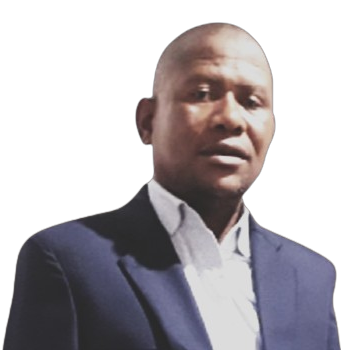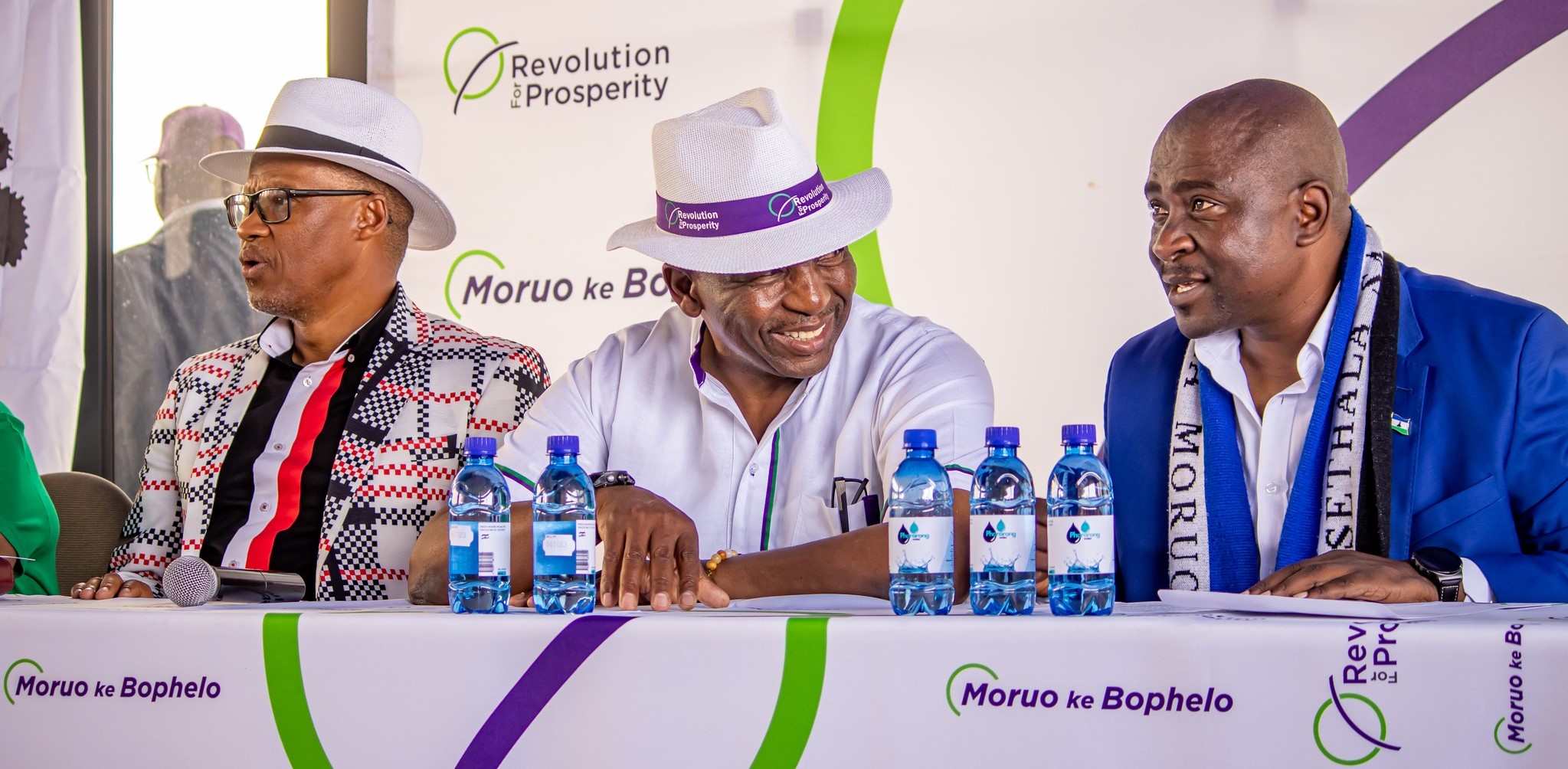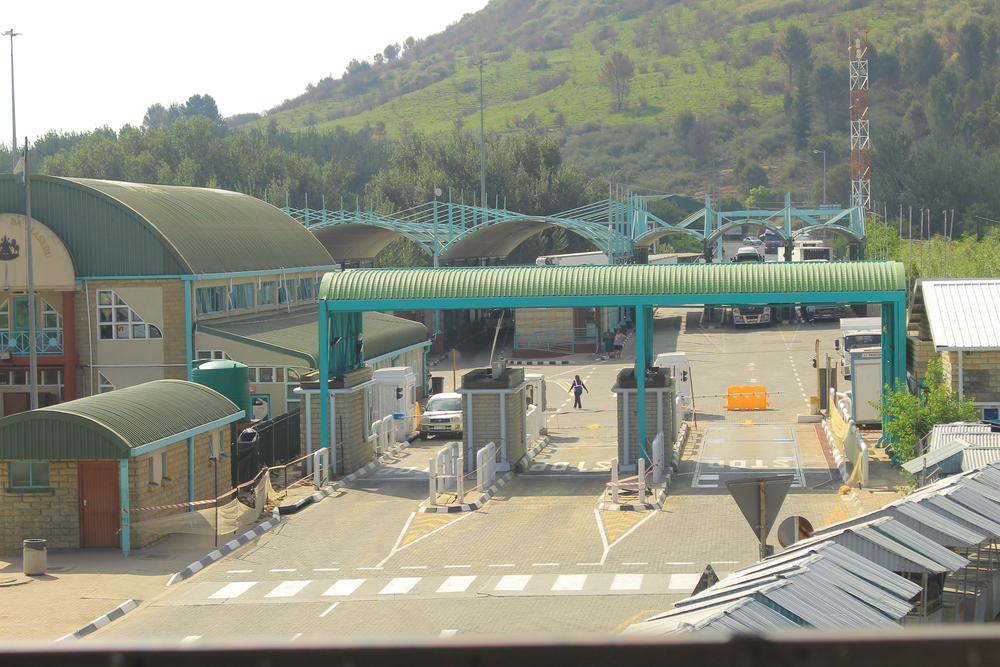NEWS ANALYSIS: When a leader loses support of lieutenants, henchmen, resorts to army, spells disaster

Mr Mzimkhulu Sithetho
Managing Director of the Governance Institute for Sustainable Development and Editor-In-Chief of thizkingdom.com

A leader's weapon is integrity and ethical aptitude
Every leader's first and foremost weapon is more internal than external. The internal weapons are integrity, visionary ability, ability to build and mend relations, composure, tolerance of dissent and resourcefulness. Others are becoming an inspiration to current and potential followers. Other external qualities of a leader are strategic thinking, listening to followers, but choosing the right direction, being a quick learner and also managing change. A leader's success lies in his own personal-making than the externalities, such as his henchmen, friends and cronies and lastly, the army. But since he is influenced by the environment within which he or she operates, a leader has to be cognisant of the external environment such as the ability to control the army and even his inner circle, as these can be dangerous to him.
A leader who is unethical, intolerant of opposition, destructive of already built relations, factional in character and only surrounds himself with the '˜yes men and women', that leader's tenure is short-lived. A leader who takes less strategic decisions, which are quick-wins for himself and those close to him, risks losing even that inner circle in the long-term. People are clever to calculate their own benefits in the long-term and they know when a leader is just a dead snake. The inner circle is even more dangerous because it knows the leader very well and can pre-empt his or her thoughts, actions and moves quickly. They can tell if they are going to benefit or not in any undertaking. What obtains with the ABC Leader, Thomas Thabane might be a manifestation or reflection of gradual loss of the fabric of his inner circle.
The inner circle, henchmen and lieutenants
An inner circle is a group of people or members who are loyal to the leader, who pay excessive allegiance to him and who are confidantes to the leader. They get the benefit of the trust of the leader and also pay back through direct benefits such as positions in government and the party. They defend he leader even when he makes mistakes, for fear of being viewed in the negative light or challenging the authority of the leader. it is also for their own self interests. This appears beneficial to the leader in the short-term as he is told what he wants to hear and is not criticised for his mistakes. He lacks the benefit of getting the flipside of this thoughts and actions. He feels strongest when he wields power to his inner circle, which is cascaded down to the rank-and-file who are sometimes gullible and vulnerable. The followers sometimes just follow suit because they are in pursuit of benefits of a basic nature such as security of jobs, some even a meal for the day. Sometimes, leaders use the inner circle to brainwash followers by dangling the carrot to the vulnerable and easy-to-use followers who have little information and can believe everything they are told and spread it to the general populace. Clever leaders appoint spin doctors who play with the minds of the followers to twist the truth and indoctrinate poor and uninformed followers to believe in and on a cause of action that is malicious in the long-term.
The flipside of the inner circle is the detractors or those whom the leader does not trust, but only wants their political support. He is assured of not only the support of the inner circle, but its protection of him against his detractors and enemies. Sometimes, a strong inner circle goes beyond issues of consanguinity, but trust is an important ingredient for building a strong inner circle. A clear example here is the case of ABC's leader, Thabane, who has his son-in-law, Lebohang Hlaele, but who is not his confidante and rather, Samonyane Ntsekele. Hlaele, though related to Thabane by consanguinity, is not politically enjoying the same trust as Ntsekele does.
A leader is able to naturally wield power if he is charismatic, which bequeathes on him, the ability to exert a lot of influence on those around him and even outside sometimes. An inner circle also wields enormous power and influence, but it is as long as it is still enjoying the trust of the leader. The inner circle is often shielded by its leader. It would do almost anything to protect the leader and to show to him and his detractors that they are indispensable to the leader and cut down anyone who poses existential threat to the leader or the inner circle. In most cases, henchmen and lieutenants go against their own ethical aptitude and can risk external image while they are wrestling with those who they think pose existential threat to them and the leader. Though they are calculative, but they become emotionally and sentimentally attached to the leader to the extent that they fail to calculate the long-term benefits as leaders come and go. The leader might be exonerated as he might go at any time and might come out clean in the long-term if he is smart. Those watching from outside might disparage the inner circle for having ill-advised the leader for his mistakes and forgive him for his ill-deeds during his tenure.
When a leader starts to kick out his own inner circle, it poses a threat to his or her longevity in the leadership position. The centre may start to fail to hold as he can be sabotaged by the inner circle, that knows the ins-and-outs of him and his technics and strategies. This is the reason some filthy and evil leaders get rid of those who were close to them (or their surrogates) when things go wrong for fear of exposure. Some members of an inner circle are smart ones, who first calculate short-term, medium-term and long-term benefits of being close to a leader. Also, a leader must from the outset, invoke his or her ethical campus and not accept ugly truths and dangerous reports he or she is fed by the inner circle. He must meticulously analyse and assess the validity and intent of the information he is fed by his henchmen and lieutenants. He must assess the conduits of the truth or information he is told, assess the goals of the messengers as some may turn out to be nefarious at the end. Some messengers are smart when they navigate their choke-points and toll-gates without raffling any feathers, but in a mild manner that does not pose any threat to the leader. They may do so even when they are bringing dangerous information, and this is sometimes in competition with their fellow members in the inner circle.
Therefore, the leader has to be sensitive to the information he consumes from his inner circle because most leaders fall at a time when they have reached their peak point in leadership. Those strengths turn out to be their weakest points. For example, Thabane's downfall comes at a time when he has built a powerful circle of henchmen and lieutenants around him, some of whom turned out to be his threats and sometimes enemies. It was not thinkable that Tefo Mapesela and Keketso Sello would now be on the opposite site to Thabane. Mapesela is the former spokesperson of ABC, who was Thabane's henchman and Sello was part of Thabane's inner circle.
The only difference in Thabane's case is that there is another third factor, his wife, Maesaiah, who also wields a feminine, but political power. Grand leaders have their spouses as their source of support and strength, but they the limits to which they have to put them if they are to be in power for long. Some women get intoxicated with power and most of the time, when exposed to taste it, they pull them husbands by their noses. The latter group is a serious and dangerous weakness of a leader who is pulled by the nose by his wife. It is largely believed in many circles, even beyond politics that the predicament of Thabane was that he did not set limits for his wife. Sometimes, it is alleged, his inner circle had to be the one accepted and sometimes chosen by his wife. Conversely, Maesaiah is believed to have failed to play the first lady and spousal support roles towards his husband, but wanted to play the front line. This is dangerous because it weakened her husband, not only as a family head, but also as a political party and government head.
Leaders do not decimate their detractors
As earlier mentioned, a smart leader is the one who is strategic in thinking. Though it is not naturally easy for any leader to accept open, and even constructive criticism, it is sometimes those a leader views as detractors who are beneficial to him in the long-term than the supporters. The trick of criticism and sometimes cynicism is that when it comes, it is piercing and conjures up images of destruction, bitterness of those on the other side as well as lack of support. Therefore, a leader who is not smart, quickly and completely dismisses criticism and appreciates those who support him or her, even when he is wrong. But strategic and clever leaders may not take their detractors, critics and cynics completely outside the picture. They may pretend to be against them, especially to appease their inner circle and followers, but have a soft spot for them and appreciate their viewpoint.
Detractors, critics and cynics are those people who will not mince their words to tell a leader that what he is thinking and doing is wrong or outside the mark. They are not popular in most cases as they are viewed as posing a threat to a leader's comfort zone and also wanting to depose him or her. Without necessarily indicating that a leader has to be a free-for-all who submits to everyone, without stamping one's authority, opposition and constructive criticism are worth taking into serious consideration. Criticism and an opposing view give one a flipside of what the leader is doing or thinking. Even if the leader will have his own way after listening to the criticism and opposition, the minority voice is sometimes the right one as it is pure and not contaminated with lies and ill-intentions of close confidantes who sometimes say or do things just to steal the limelight.
Go early to avoid torrential rains
Another critical factor surrounding a leader is the ability to understand the value of time in one's leadership. Staying within a short time enough to make impact, but leaving a dent is critical. Leaving early before too many cooks spoil the broth is of outmost importance. There are three stages in a leader's tenure, the introductory and planning stage where everyone is still happy with the leader and supports him. The first stage is where everyone is intoxicated with victory, say in an election and everything is taken to be going well without calculating the future hurdles. There is also the implementation stage, which is full of challenges and fortunes. The second stage is where what has been promised a the introducroy stage is put into motion and tested for its validity and fruitfulness to the beneficiaries. If this stage is successfully passed, it will have a positive multiplier effect if effectively passed. It is where the leader's ability, not only to mobilise people to follow him, but also to put in place, strategies and plans that serve his followers' needs. This is the critical stage where a leader should assess his abilities and ponder his future. There is lastly, the wrapping-up stage, which might be a stage where support has declined, and reality is showing signs.
In the case of Thabane, when he founded the ABC in 2006, it was elation everywhere and people referring to him as a Joshua who has to take Lesotho to the promised land. There was ecstasy among the rank-and-file, let alone, his own charismatic character. Everyone supported his first five years as leader of the opposition in the 2007-2012 parliament because he could articulate the shortfalls and weaknesses of the then regime well to his followers. He could articulately and eloquently promise what he could do when elected, which was different and better than his predecessors. People believed him, moreso drawing on his long stint in the civil service and his much-vaunted effectiveness in various principal secretary and ministerial portfolios he held. He was able to convince many who followed him. But when it came to his time to deliver, first in 2012-2015, he showed signs of deficiency in the critical areas that a leader must excel in. One of them is the ability to bring together warring factions in one’s camp.
Other deficient abilities are tolerance of dissent and criticism, weak integrity, lack of strategic ability to listen to truth and also living by one's word. He proclaimed his fight against corruption, but failed to live up to his word. The last is the ability to recognise the value of time one has to be in a leadership position before one leaves under pressure when one is being pushed to go. Thabane received the mantle of leadership at an advanced age in his life. He lived a better part of his life struggling to get his foot and organise his own team at the helm of things. He wasted much time in the Lesotho Congress for Democracy (LCD) trying to stamp his power and authority, but was pushed away from the then leader by members of the inner circle, of which he was part. It was too late when he realised the need to jump ship and form his own thing, the ABC. He was nearing the 70s and he had to take another five years waiting outside for the right time as leader of opposition.
When Thabane came to be captain of the ship in 2012, he did not have the absolute authority to make independent and unchallenged decisions as he was in a coalition government. secondly, he was gradually ageing and his stamina was beginning to deteriorate. Thirdly, he brought in a young person in his personal life who doused the fires. In government, he unfortunately had to reveal his authoritarian and sometimes dogmatic DNA. did not work for him until the coalition collapsed in 2014 and ushered in a fresh poll. After the 2015 election results were out, he failed to garner the necessary vote margin to outrightly form a government on his own without entering into a coalition. Even an attempt to form a coalition government did not yield results as it did not muster enough votes to reach the required threshold of 61 seats in parliament. He had to wait another two years while his ship (ABC) was being maintained in readiness to take the reins of power alone as he fails to be engaged in a too much consultative coalition. His self-imposed exile worked for him from a political point-of-view, but in the long-term, it destroyed his presence in the domestic politics of Lesotho. He only survived in the 2017 elections for two reasons. One, the serious weaknesses of the Khokanyana-Phiri coalition of unleashing the army on citizens, threats to the nation in many respects and subjecting the country to international exposure, negatively so as well as the regime’s failure to meet the demands of the majority of citizens. Two, he received sympathy from the electorate that he had been done a blow. Three, the assassination of Lieutenant-general Mahao added value to Thabane’s success in the 2017 elections. It is understood why the Mahaos felt they needed to be compensated by the ABC for their brother who paid a price for being supportive to Thabane.
Thabane could have saved his head if he did the following. He should have allowed the Nqosa Mahao-led National Executive Committee after its election in the elective conference of February 2009, giving credence to being a democratic leader who respects the voters' choice. He could have convinced his inner circle and the ABC members about the need to accept Mahao as his deputy leader in the ABC. But instead, he danced to the tune of opportunistic and bitter losers at the ABC elective conference to twist his arm towards not accepting Mahao for their own interests. He should have placed his son-in-law, Lebohang Hlaele, close to him so that he used him to champion a cause for ABC among its detractors.
Lastly, Thabane should have asked ABC members to ponder on an appropriate candidate to be his successor both in the party and government and led the process unfold without him influencing it or indirectly doing so. This would have absolved him as a leader from the shenanigans of his inner circle rejecting Mahao. He should have, from as early as 2015, made his intent to retire from active politics and in government. By now, he could be at home, after his choice to retire freely, enjoying his pension with his family. He would be a revered statesman and politician. But now, he leaves office under duress, even pushed by the international community to vacate office. Though it is dubbed dignified and secure departure, it is tainted by so many misgivings of bis own making. It is a disgrace to have a person of the stature and calibre of Thabane, who has worked for the country since independence to leave office under such circumstances. Also, the pending case about his alleged involvement in the assassination of his wife, Lipolelo also adds salt on an open would. It remains a cloud that will hover over his head for the foreseeable future. Even if he successfully retires now, that issue will remain a dark spot until courts of law have concluded the matter.
Never put trust in the army as a first resort
The last straw for Thabane has been to resort to the armed forces to deploy them put out fires where there were none. Any leader whose stronghold is the armed forces is a weak leader. The army is just a national machinery to protect the nation against external attach and to protect the constitution. Mind you, they can protect the constitution against him, if they feel he goes astray. This is what happened in Zimbabwe. Robert Mugabe used the army as his first and last resort to cling to power, until one day, the army turned the tables and protected Zimbabweans against their own leader, Mugabe. He was deposed within a space of a week after leading the nation for almost four decades. The latest stunt that Thabane pulled in front of the international community was when he roped the army into the political minefield to extinguish fires that were started by him, and led to detriment. Not in the 21st century, politics of the army going hand-in-glove with dictators is long passed by events and is no longer a grand idea.
Most Read
New coalition government-in-waiting unveiled

The cooling of the political temperatures came with the BAP joining the bandwagon after a season of political agitation and chess games, reflecting political anomalies in the system of political governance of Lesotho:

Close Examination of Lesotho’s Diaspora Management in South Africa in Light of the Recently Inaugurated South Africa-Lesotho Bi-National Commission (BNC)

Related Stories
Government outlines interventions to reduce the impact of the lockdown during this trying time for Basotho

Opinion Vote Polls
Do you think the existing government is going in the right direction to benefit the people of the country?
Subscribe for your daily newsletters
Enter your email to subscribe to our newsletter.

